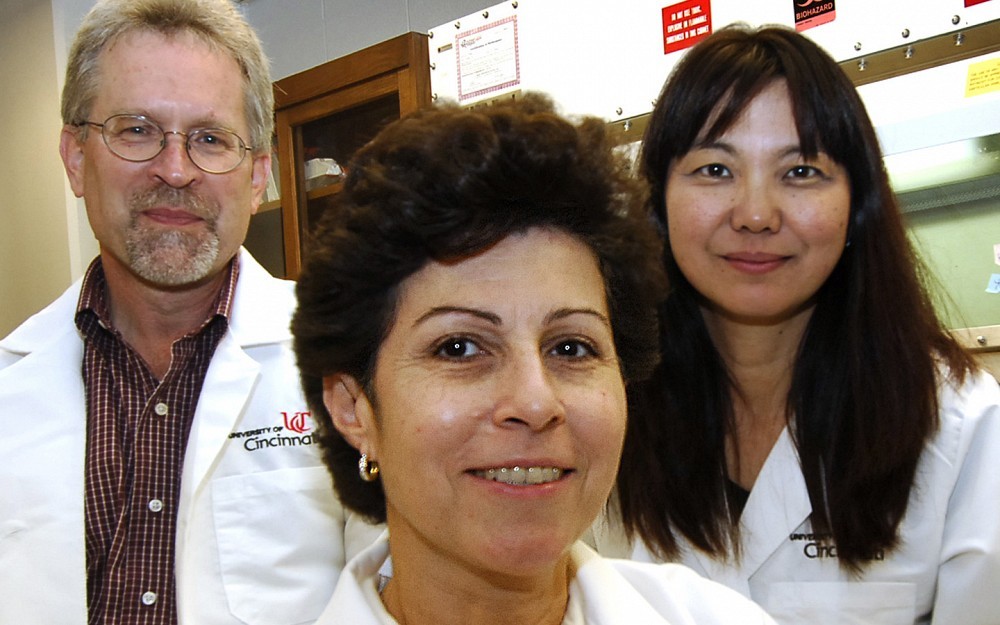
UC Given $1 Million to Develop Skin Cancer Prevention Treatment
CINCINNATIA research team led by University of Cincinnati (UC) scientists has received $1 million from the National Cancer Institute to develop a new topical treatment that would not only increase skin pigmentation to block harmful ultraviolet (UV) rays, but also repair damage that can lead to skin cancer.
The researchers will work with a chemically modified hormone called alpha-melanocyte stimulating hormone (alpha-MSH). Known to increase skin pigmentationthe tan that reduces dangerous UV ray penetrationalpha-MSH has also been found to repair precancerous damage that UV rays do to skin cell DNA, the genetic material within cells.
We hope to develop a new topical cream that will prevent skin cancer by both increasing skin pigmentation and at the same time repairing DNA damage caused by UV radiation, says study leader Zalfa Abdel-Malek, PhD, of UCs dermatology department.
We have already shown that alpha-MSH repairs DNA damage caused by excessive sun exposure, thus reversing the cancer-causing effects of UV radiation, says Abdel-Malek, who has studied this phenomenon in isolated human melanocytes, the cells that produce the tanning pigment melanin.
Abdel-Malek will work with Ana Luisa Kadekaro, PhD, a UC dermatology instructor, to determine the ability of alpha-MSH, and synthesized versions of it, to reduce DNA damage in melanocytes that have been exposed to UV radiation in the lab.
To make it easier for the hormone to penetrate the fatty lipid layer of the skin, team members James Knittel, PhD, of UCs College of Pharmacy, and Carrie Haskell-Luevano, PhD, of the University of Florida, have already reduced alpha-MSH from its original peptide chain of 13 amino acids to a chain of only four amino acids. They hope to make the chain even smaller, and consequently more effective at penetrating the skin to target the melanocytes.
Dorothy Supp, PhD, of UCs department of surgery, will study the synthesized peptides on artificial skin to determine whether, if applied as a topical cream, they can be absorbed through the skin and delivered to the melanocytes.
Gerald Kasting, PhD, also of UCs College of Pharmacy, will test stability as well as penetration of the smaller peptides on live or cadaver skin.
According to the American Cancer Society, sun exposure is the main cause of skin cancer, of which 1 million new cases are diagnosed each year. Advanced melanoma, the deadliest form of skin cancer in the United States, resists chemotherapy and has a high potential for spreading to other organs.
Although melanoma currently accounts for only 8 percent of skin cancers, it causes almost all skin cancer deaths, and its incidence is rising at the rate of 4 percent a year. Melanoma is also the fifth and sixth most common cancer among men and women, respectively.
The impact of this grant is potentially tremendous, says Abdel-Malek. If this new prevention strategy works, it could ultimately reduce the ever-increasing incidence of skin cancer. It would especially benefit people with known high risk for skin cancer in general, especially those with fair skin, and might ultimately reduce the incidence of melanoma and prevent its recurrence in highly susceptible individuals.

Researchers James Knittel, PhD, Zalfa Abdel-Malek, PhD, and Ana Luisa Kadekaro, PhD

Dermatology researchers Ana Luisa Kadekaro, PhD, and Zalfa Abdel-Malek, PhD, in the lab.
Tags
Related Stories
UC study: Brain organ plays key role in adult neurogenesis
July 2, 2024
The University of Cincinnati has published research in the Proceedings of the National Academy of Sciences that found the choroid plexus and cerebrospinal fluid play a key role in maintaining a pool of newly born neurons to repair the adult brain after injury.
Put down that beer; it's not a tanning lotion
July 1, 2024
The University of Cincinnati's Kelly Dobos joined WVXU's Cincinnati Edition to discuss what's fact and what's myth when it comes to sunscreen use, different kinds of sunscreen and a social media recommendation to use beer on your skin to help get a tan.
Cincinnati researchers want to know if MRIs can work better
June 28, 2024
WVXU and the Cincinnati Business Courier highlighted a new collaboration between the University of Cincinnati College of Medicine, UC Health GE HealthCare, JobsOhio, REDI Cincinnati and Cincinnati Children’s to create an MRI Research and Development Center of Excellence located on UC’s medical campus.
